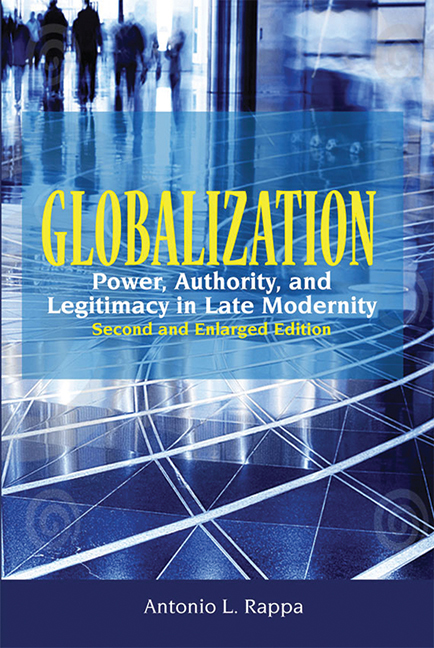Preface to the 2nd and Enlarged Edition
Published online by Cambridge University Press: 21 October 2015
Summary
What does it mean to be alive in late modernity today? The second edition, Globalization: Power, Authority and Legitimacy in Late Modernity, analyses the competition for global control over scarce resources. Despite the failure of economic instruments and the loss of economic confidence across the world (2007–10), the United States (U.S.) remains a superpower primus inter pares. U.S. power is embedded within a domestic military-industrial complex that is legitimized by civil society under the authority of a democratic ethos that is presumed to be universal. The United States is the only country that has been continuously at war for over a century with a global impact. Indeed, the Cold War (1955–89) galvanized the United States and the rest of the “Free World” under the ideological umbrella of neoliberal capitalism. Not surprisingly, most nations today are tied directly or indirectly to the U.S. economy. This means that if the U.S. sinks, the weight of its debt will have a significant impact on the balance of trade with the rest of the world. Francis Fukuyama proclaimed Western liberal democracy, in The End of History and the Last Man (1992), as the conclusive form of government. Current cultural history keeps proving Fukuyama wrong. If it took Americans 233 years to inaugurate the first male African American as president, what more can be expected of nation states that are much younger along the transition to democracy? What is the point of democracy if half of the world's population owns less than 10 per cent of the world's resources? What does it say about democracy if there has never been a woman president for over 200 years although women make up at least half the U.S. population? Does the United States represent the end-state in which fledgling democracies in Southeast Asia, Africa, Latin America, and the Pacific can look forward to? Despite its long years at empire-building and shoring up the democratic ideological belief system, the United States continues to face many domestic challenges along the lines of class, ethnicity and gender. President Obama's domestic policies are tied to foreign policy. The one impacts the other. The globalized world in the post-Iraq, post-Afghanistan, and post-terrorist world will be surfeit with a new protectionism. This new protectionism is already on the rise.
Information
- Type
- Chapter
- Information
- GlobalizationPower, Authority, and Legitimacy in Late Modernity (Second and Enlarged Edition), pp. ix - xiPublisher: ISEAS–Yusof Ishak InstitutePrint publication year: 2011
